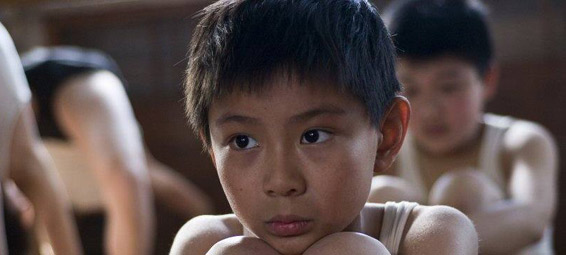The showcase on Monday at the Asian Film Festival of Dallas was Mao’s Last Dancer, whose screening was attended by dozens of people involved in the film. Most of Bruce Beresford’s movie takes place in Houston (and features Kyle MacLachlan attempting a Texan accent), so several Texan investors and producers were in attendance.
Mao’s Last Dancer is a distinctly Western film, and the festival knows it, as does its audience. Apparently the leading contenders for the Audience Award so far are Robogeisha, Ip Man 2, the anime Summer Wars, and the horror film Phobia 2. If you read yesterday’s recap, you know my allegiance lies with those mechanical geishas, but here were two yesterday that gave them a run for their money, and one that didn’t:
Beijing Taxi
Director Miao Wang would not have made her documentary the way she did if she didn’t have to, but that is part of what makes it brilliant. It claims to be about three Beijing cab drivers, but that plotline is ultimately a front, since the real subject is the effect of the Olympics on Beijing. In fact, Wang sometimes seems to forget about her three subjects: Bai, an aging driver with health issues; Zhou, an apathetic, happy-go-lucky driver who converts to buses; and Wei, the only woman, who wants to divorce her husband and is obsessed with attaining some “freedom.”
The film is not a comprehensive portrait of these souls, nor of the souls they carry in their cabs, but it is a detailed look at the city they drive through. Beijing can seem so impenetrable. This is one look inside, and though it is insufficient, it is exhilarating.
There are no interviews with officials, and we get only brief glimpses of the Chinese government — posters on evicted houses that read “Don’t believe the rumors. The government is here to help you.” One memorable scene involves a bus tour during the Olympics, in which a trained tour guide tries to paint a positive light on everything to his out-of-towners. “Where are all the historical buildings?” one traveler asks. “All I see are skyscrapers.” The tour guide is silent, a big smile on his face.
Accident
Hong Kong director Cheang Pou-Soi’s taut little film Accident is clearly influenced by many Western greats, The Conversation and The Lives of Others among them, but it bears the most resemblance to Kurosawa’s corporate thrillers like High and Low and The Bad Sleep Well.
Featuring Louis Koo as an assassin who specializes in making deaths look like accidents, the film has incredible pacing. It’s unhurried and confident, with several extended sequences that build in quiet suspense. When the accidental deaths come, they are always worth the wait. It’s ultimately a predictable movie, and a heavy-handed solar eclipse makes an appearance in the final moments, but it’s a mature film with real thrills. Try to find it.
Kamui
My apologies for recommending Kamui yesterday, because it turned out to be the worst film I’ve seen at the festival so far. At the beginning, it was so overwrought and incoherent that I thought it had to be a comedy, and I started laughing. I never stopped, because that was the only way I could get through it. But it was sometimes a challenge to laugh at this super-serious film, which attempted to be a live-action anime. It had some of the worst CGI I’ve ever seen — sharks getting harpooned mid-air, a horse getting amputated, ninjas bouncing up a mountainside. The script seemed to be written by a 14-year-old boy: “I’m having difficulty breathing underwater!” “You’re going to die here, Kamui. This will be where you die.”
I’ll try to pick them better today. You already know that I want you to catch the family drama Talentime tonight at the Magnolia at 7:20 pm, but here are two more that look promising:
Iron Crows – A South Korean documentary about old ships being dismantled off the coast of Bangladesh. It focuses on the workers, but AFFD programming director Steve Norwood says that the film is beautiful and haunting, both in its images and its sounds—the strange reverberations of old metal being torn apart. It’s also barely over an hour. (Magnolia, 2:40 pm)
Chaw – Another South Korean offering, but it looks irresistible. Described by Norwood as “equal parts nature-gone-wild thriller, ecological cautionary tale, and dark slapstick,” it sounds a lot like 2006’s The Host. Instead of a sea mutant, it’s a man-eating boar. (Angelika, 9:45 pm)
(Main Image: From Mao’s Last Dancer)





